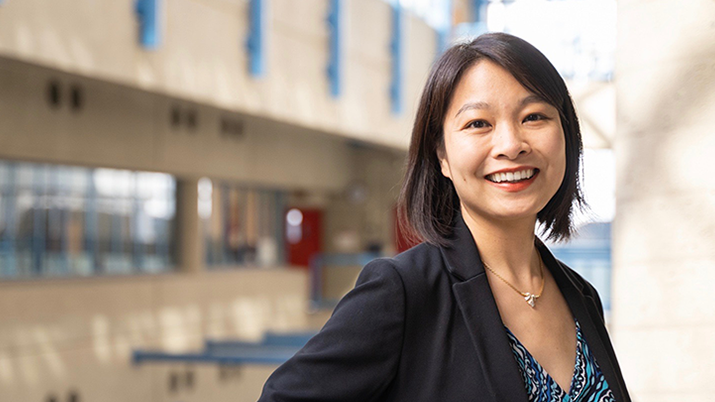

Grace Truong is a three-time UBC Psychology graduate.
For Grace Truong, a career in psychology was not predestined. It was during her first year as an undergraduate student that she developed her passion for psychology. Truong, who received a 2016-17 Killam Graduate Teaching Assistant Award for her excellence in teaching, hopes to inspire this same passion for psychology in her students.
A recent PhD graduate in cognitive science at UBC, Truong’s approach to teaching is similar to her research interests; it focuses on the self and linking what’s out there to what’s inside.
In this Q&A, Truong shares what attracted her to teaching and what she learns from her students. And her advice for students? Go for it!
First of all, can you tell us a little about yourself?
I grew up on a farm just outside of Vancouver in a family with zero psychologists and zero professors so my current career was not necessarily predestined. During my first year as an undergraduate, I took introduction to psychology as a fun elective but grew to like it more than everything else I was learning. I joined different research labs and went on to stay at UBC for my MA degree and PhD. I’m looking forward to inspiring a love for psychology in others.
What attracted you to teaching?
As early as high school I always got a kick out of seeing the light bulb going off in someone’s head, that expression you get when something finally makes sense. Since then I have enjoyed making those moments happen, especially for more challenging topics. Helping a student prove to themselves that they can grasp what was initially confusing or complicated sets the stage for greater confidence and hopefully greater desire to learn. When a student says at the end of term that they want to take more courses on the subject I’ve taught, that’s the best.


How would you describe your approach to teaching?
My approach to teaching, like my research interests, is all about the self and linking what’s out there to what’s inside. Where and when and how do the ideas from psychology apply to our own lives? How do our own personal experiences reflect or contradict what is currently known about human brain and human behaviour?
What can you learn from your students?
Students ask great questions. They come in with their own perspectives, their own knowledge, and their own sense of curiosity. Together these elements lead to pretty insightful questions that I would have never thought to ponder myself.
What learning or studying advice do you have for your students?
One, seek understanding over memorization. When you truly understand a concept or a process, you can apply it to all sorts of different situations. Even better, nerdy jokes suddenly make sense and the world becomes a funnier place. And two, teach others. One of the best ways to gauge your own knowledge is to explain it to another person.
What are your research interests?
My research looks at how ownership (as a form of self-relevance) changes the way we pay attention to objects. You can have two perfectly equivalent objects in front of you but somehow everything changes when you learn that one of those objects belongs to you. I’ve examined how interacting with objects and moving them around affects people’s ownership bias and more recently I’ve demonstrated that we tune our attention towards our possessions such that we notice them before we notice other things. These days I’m examining how ownership interacts with other factors like reward.
Do you have a motto or favourite quote?
My father always tells me, “Go for it!” and, simple as those words are, they have pushed me to take the initiative and try new and scary/exciting things. I also encourage my students to go for it because you never know what opportunities you’ll come across until you put yourself out there.
What do you like to do in your free time?
When the sun shines I like to go hiking and biking and every once in a while, I’ll spend some time knitting or doing yoga. My other passion in life is following Canadian and American politics, especially around election time.


